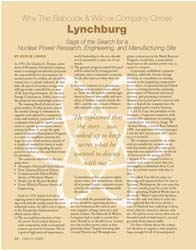Why the Babcock & Wilcox Co. Chose Lynchburg




Saga of the Search for a Nuclear Power Research, Engineering, and Manufacturing Site
In 1950, Dr. Charles A. Thomas, president of Monsanto Chemical Company, made a seemingly unorthodox proposal: the responsibility for development of nuclear power for civilian use should be turned over to private industry. At that time all aspects of nuclear energy were still rigorously controlled by an arm of the federal government, the Atomic Energy Commission. Public reaction to the proposal was surprisingly positive.
The ensuing flood of interest and great number of valid queries caused the Atomic Energy Commission to organize and expand its communications with industry, particularly with companies that had no significant contracts to operate government-owned nuclear facilities. It set up the aptly named Industrial Participation Program to convey to qualified consortia the huge amount of information (much of it classified) needed for them to make realistic decisions regarding the prospects for nuclear power and their future involvement.
The consortia admitted to the program were:
• Monsanto Chemical/Union Electric
• Dow Chemical/Detroit Edison
• Commonwealth Edison/Public Service of Northern Illinois
• Pacific Gas & Electric/Bechtel
• Foster Wheeler/Pioneer Service & Engineering
Entire article available only in printed version. Lynch's Ferry is on sale at the following Lynchburg locations: Bookshop on the Avenue, Givens Books, Lynchburg Visitors Center, Old City Cemetery, Point of Honor, Market at Main, and Lynch's Ferry office at The Design Group, 1318 Church Street, Lynchburg.
In 1950, Dr. Charles A. Thomas, president of Monsanto Chemical Company, made a seemingly unorthodox proposal: the responsibility for development of nuclear power for civilian use should be turned over to private industry. At that time all aspects of nuclear energy were still rigorously controlled by an arm of the federal government, the Atomic Energy Commission. Public reaction to the proposal was surprisingly positive.
The ensuing flood of interest and great number of valid queries caused the Atomic Energy Commission to organize and expand its communications with industry, particularly with companies that had no significant contracts to operate government-owned nuclear facilities. It set up the aptly named Industrial Participation Program to convey to qualified consortia the huge amount of information (much of it classified) needed for them to make realistic decisions regarding the prospects for nuclear power and their future involvement.
The consortia admitted to the program were:
• Monsanto Chemical/Union Electric
• Dow Chemical/Detroit Edison
• Commonwealth Edison/Public Service of Northern Illinois
• Pacific Gas & Electric/Bechtel
• Foster Wheeler/Pioneer Service & Engineering
Entire article available only in printed version. Lynch's Ferry is on sale at the following Lynchburg locations: Bookshop on the Avenue, Givens Books, Lynchburg Visitors Center, Old City Cemetery, Point of Honor, Market at Main, and Lynch's Ferry office at The Design Group, 1318 Church Street, Lynchburg.
^ Top
Previous page: Early Packet Boat Days
Next page: Mount Athos
Site Map




